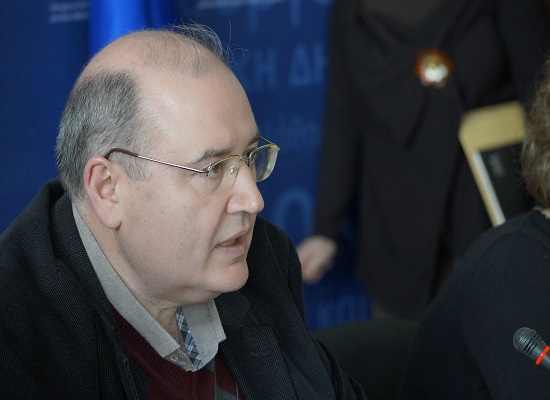
Education Minister Filis discusses Brexit, election law, church-state ties
Education, Research and Religious Affairs Minister Nikos Filis’ interview with Ta Nea daily 25-06-16
In a wide-ranging interview, Education, Research and Religious Affairs Minister Nikos Filis discussed the causes and impact of Brexit, government plans to introduce a directly proportional electoral law, the issue of church-state separation, future labour reforms, and what one can expect as a leftist policy mix in a time of bailout memorandum restrictions.
Brexit impact
Filis said that Brexit has created additional uncertainty at a time of European crisis, and that austerity, fiscal oversight, the rollback of social rights, the limits placed on democracy, and a frenzied opposition to migration altogether are creating a dangerous regression into nationalism that will not benefit the peoples of Europe.
“If we return to acute, grand nationalist clashes and imperialist contests, history shows that this leads to historic impasses and nightmarish prospects. Imagine in Europe a restart of contests for spheres of influence, between a euro that will increasingly resemble the Deutschmark and the Pound Sterling. Imagine large countries such as France falling into the clutches of the far right,” Filis said.
“The answer is not an insistence on policies that abolish programme distinctions between states in the name of neutral technocratic management. The answer is the politicisation of and satisfaction of the needs of society. Such a path to another Europe presupposes a strengthening of leftwing and progressive forces, parties and movements,” he noted.
Electoral law, constitutional revision and proposals for direct election of the President of the Republic
Indirectly rejecting direct election of the president, Filis said that a further centralisation of power is not the aim, nor is the problem the dominant position accrued over decades in the office of the prime minister, but rather the aim is a bolstering of parliamentarism and of forms of direct and indirect democracy. Filis said the weaknesses of the political system bemoaned by citizens are related to the need for a democratic, transparent operation of institutions such as the cabinet, parliament, regulative and oversight mechanisms such as independent authorities, and of power centres such as the media.
Filis said that a constitutional revision must provide safeguards against a return to the corruption and patronage that plunged Greece into crisis. He called for the abolition of article 86, which provides a very short statute of limitations for crimes committed by ministers while in office, the introduction of parliamentary term limits, bolstering the independence of the judiciary, and measures to render more distinct the roles of church and state.
Directly proportional electoral system
Filis underlined that the institution of a directly proportional voting system has long been the basic, unswerving choice of the Left for all elections – parliamentary, the European Parliament, local elections and trade union elections. It is linked to authentic representation, to the cleanup of the political system, and to the upgrading of institutions that ensure transparency and social oversight. “We will not introduce a system tailored to the needs of SYRIZA, as previous governments did while in power,” Filis said, noting that the three percent threshold for entering parliament will be retained, so as to bar small splinter parties that may be organized around an individual and possibly be backed by non-transparent financial and media interests that could act as agents of destabilisation.
Church-state separation
Asked if it is in fact impossible for a leftwing government to achieve a separation, Filis said that the further distinction of the roles of church and state is an electoral programme pledge of SYRIZA and a demand of many centrists and liberals. “This is a mature demand of society, which reflects the need for a contemporary and democratic state in a multi-cultural environment,” he noted, adding that this should be done without unnecessary “divisions and anathemas” between the parties.
Asked why the state pays the salaries of clergy, Filis said the church seems to seek state protection still, as it operates essentially as a state church, and that other countries have resolved such issues through a separation of the realm of activities of church and state, which should take place in Greece as well, through a respectful church-state dialogue.
Labour relations reforms
It is difficult but necessary for us to go to battle to ensure labour rights. Economic growth is not viable without p5rotections for labour. In current European and national conditions, only a leftwing government is able to wage this battle.
SYRIZA economic policy and bailout memorandum requirements
“The left does not operate outside of society. It is not closed up in a monastery, trying to save its soul. It exists as a movement of change of the world with a political plan that focuses on the forces of labour, youth, social liberation, and of the environment. The government will be judged on its ability to expedite the course of economic growth with justice, and to successfully handle citizens’ daily problems while at the same time reducing the national debt.
